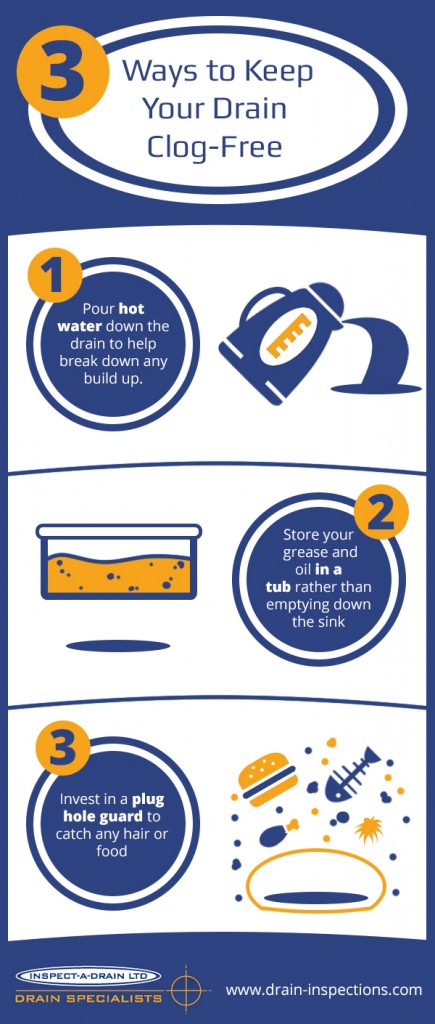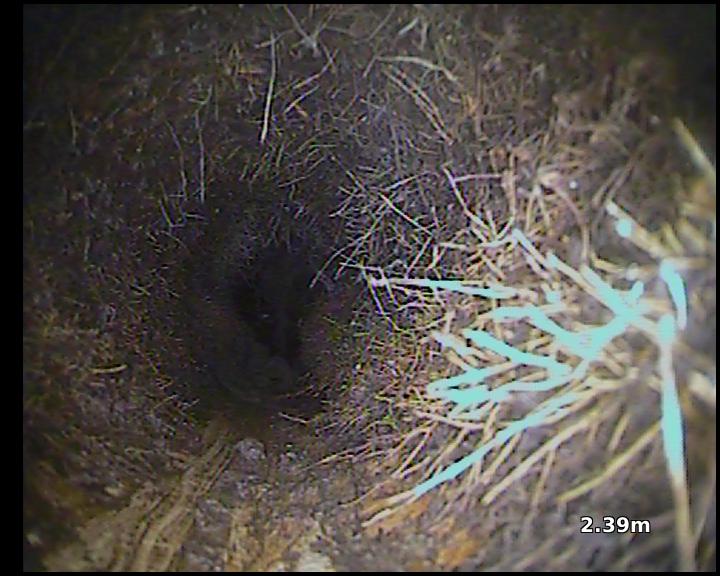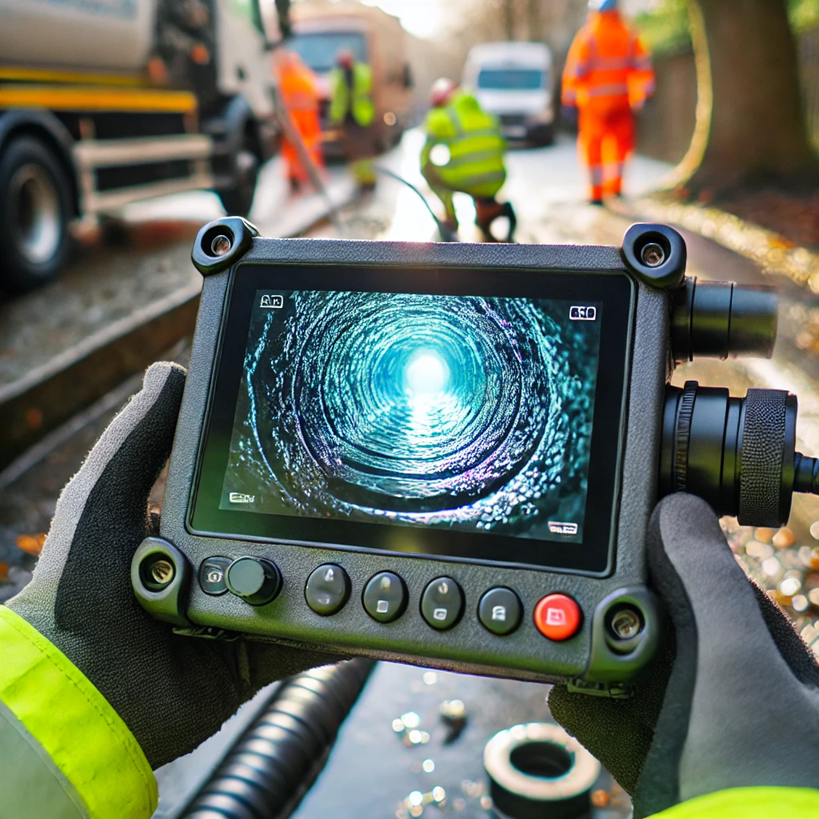Blocked drains can cause a whole range of problems, so it’s always important that you do everything you can to keep your drains clog-free. But how do you go about doing that? Take a look at our infographic for a few tips on how to keep your drains unblocked and in working order! We’ve added some fresh content under the infographic that will give you some further guidance on keeping your drains clog free.

Clog-Free Drains: A Comprehensive Guide to Keeping Your Pipes Clear
Ensuring clog-free drains is essential for maintaining a healthy and efficient plumbing system in your home or business. Clogged drains can lead to numerous issues, including foul odours, slow drainage, and even costly repairs. This article provides practical tips and advice to help you maintain clog-free drains, along with some professional solutions for more stubborn problems. It’s a pain having blocked drains, follow this advice and you should be good.
Why Clog-Free Drains Matter
Keeping your drains clear is crucial not just for hygiene but also for the longevity of your plumbing system. Here’s why it matters:
- Prevents damage to pipes: Persistent clogs can cause pressure build up in your pipes, leading to cracks or bursts.
- Saves money on repairs: Regular maintenance can prevent major plumbing issues that require expensive repairs.
- Improves home hygiene: Clogged drains can harbour bacteria, mould, and other harmful pathogens, affecting indoor air quality and overall health.
Common Causes of Drain Clogs
Understanding what causes drain clogs is the first step in preventing them. Here are some of the most common culprits:
1. Hair and Soap Scum
Hair and soap residue can easily accumulate in your bathroom drains, creating a sticky, tangled mess that blocks water flow.
2. Grease and Food Particles
Kitchen drains are particularly vulnerable to grease and food particles. When grease cools, it solidifies, creating a stubborn clog.
3. Foreign Objects
Small items like jewellery, toys, or even excessive toilet paper can get stuck in your pipes, causing blockages.
4. Tree Roots
Tree roots can infiltrate underground pipes, leading to severe clogs that require professional intervention.
DIY Tips for Maintaining Clog-Free Drains
Maintaining clog-free drains doesn’t always require professional help. Here are some DIY methods you can use to keep your drains clear:
1. Use a Drain Strainer
A drain strainer is an inexpensive tool that can prevent hair, food particles, and other debris from entering your pipes.
2. Regularly Flush Your Drains
Once a week, pour a pot of boiling water down your drains to dissolve any build up of grease, soap scum, or other materials.
3. Avoid Pouring Grease Down the Drain
Instead of pouring grease down the drain, collect it in a container and dispose of it in the trash.
4. Use a Baking Soda and Vinegar Solution
Once a month, pour a mixture of baking soda and vinegar down your drain. This natural solution can help dissolve minor clogs and deodorize your pipes.
Professional Solutions for Persistent Clogs
While DIY methods are effective for minor clogs, persistent or severe blockages may require professional help. Here are some professional solutions:
1. Drain Snaking
A plumber’s snake is a long, flexible tool used to break up and remove clogs deep within the pipes. This method is effective for most types of clogs.
2. Hydro Jetting
Hydro jetting involves using high-pressure water to clear stubborn clogs and clean the inside of your pipes. This method is highly effective but should only be done by professionals to avoid damaging your plumbing.
3. Camera Inspections
Sometimes, the cause of a clog isn’t immediately apparent. A camera inspection can identify the exact location and cause of a blockage, making it easier to address the problem effectively. Learn more about our drain inspection services and how they can help you.
4. Pipe Relining
If your pipes are old or severely damaged, pipe relining might be necessary. This process involves inserting a new lining into your existing pipes, creating a seamless, clog-free channel for water to flow.
Preventative Maintenance: Long-Term Solutions
Preventative maintenance is key to ensuring your drains remain clog-free in the long term. Here’s how you can achieve that:
1. Schedule Regular Drain Inspections
Regular inspections can catch potential problems before they become major issues. Consider scheduling annual inspections with a professional drain service.
2. Install a Water Softener
Hard water can cause mineral build up in your pipes, leading to clogs. Installing a water softener can reduce this build up and prolong the life of your plumbing system.
3. Educate Your Household
Teach everyone in your household about what can and cannot go down the drain. Simple changes, like using a drain strainer or properly disposing of grease, can make a big difference.
Comparison Table: DIY vs. Professional Drain Maintenance
| Aspect | DIY Methods | Professional Services |
|---|---|---|
| Cost | Low | Moderate to High |
| Effectiveness | Good for minor clogs | Best for persistent or severe clogs |
| Risk of Pipe Damage | Low, if done correctly | Low, when done by professionals |
| Time Investment | Moderate | Minimal (handled by professionals) |
| Long-Term Benefits | Moderate | High, with regular maintenance |
When to Call a Professional
While DIY methods can be effective, there are times when it’s best to call in a professional. Here are some signs that you need expert help:
- Recurring Clogs: If your drains frequently clog, it could be a sign of a bigger problem.
- Multiple Slow Drains: Slow drainage in multiple fixtures suggests a blockage in the main sewer line.
- Foul Odours: Persistent foul odours could indicate a clog or other plumbing issue.
- Water Backups: If water is backing up into sinks, showers, or toilets, it’s time to call a professional.
For persistent issues, consider contacting Drain Inspections for expert advice and service.
Conclusion
Keeping your drains clog-free requires a combination of regular maintenance and knowing when to seek professional help. By following the tips and strategies outlined in this article, you can ensure that your plumbing system remains efficient and problem-free. Remember, proactive care is always better than reactive repairs, so don’t hesitate to schedule regular inspections and maintenance with a trusted professional.
For more information on maintaining a healthy plumbing system, check out our blog or contact us directly through our services page.



